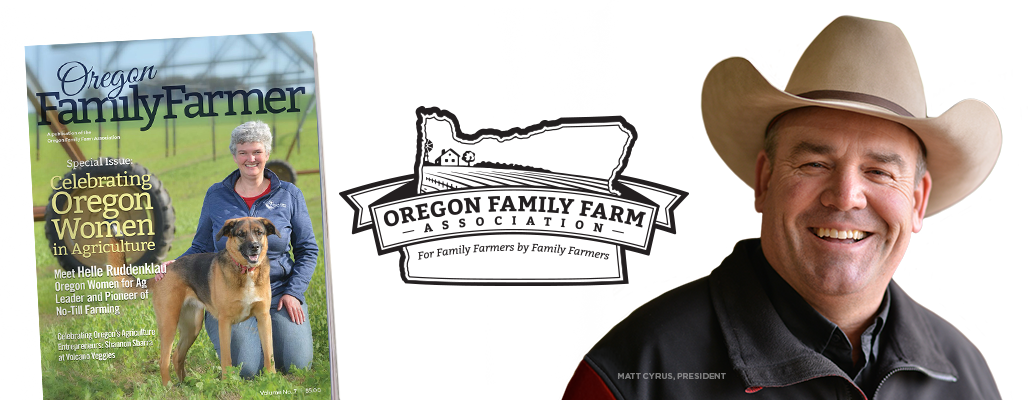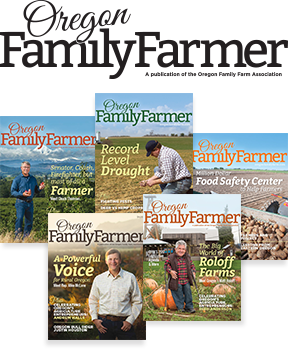A Voice for Agriculture
Words: Mitch Lies
Photos: lynnphoto.com
The idea was to finish school, be a wheat breeder and help feed the world. But the pull of the farm was too strong for Helle Ruddenklau.
“I preferred being on the farm, so I decided, I think I’ll just stop here, take what I’ve learned, take the scientific background and apply that more on a practical farm scale,” Ruddenklau says.
Ruddenklau, who holds a master’s degree in plant genetics from Oregon State University, may not be improving wheat varieties these days, but she is doing her part to feed the world and she has become a strong voice for agriculture.
Among other efforts, Ruddenklau and her husband, Bruce Ruddenklau, host a class of middle-schoolers on their farm each year as part of Oregon Ag-link’s Adopt- a-Farmer program. Ruddenklau is involved in Oregon Ag in the Classroom’s Literacy Project, which involves reading a featured book designed to educate primary school students about agriculture. She serves on the steering committee for the Oregon State University Extension Service’s Citizens Advisory Network.
Ruddenklau is president of Oregon Women for Agriculture (OWA). She frequently testifies in support of agriculture at the Oregon Legislature. And she is active on social media, posting regularly on Facebook about activities on Ruddenklau Farms.
“I believe that the more we can let people in, let them know what we are doing, be really open and explain why we do what we do, show the love we have for the land and that we would never do anything to hurt the land or hurt the environment, the more we can do that, the better off we are with the general consumer,” Ruddenklau says.
She adds, “It is so disheartening to hear when people are afraid to eat what we produce, so anything we can do to dispel that, I think is a good thing. And I think we need to have as many people as possible spreading that message.”
Ruddenklau’s participation in Oregon Women for Ag dates to when she was in college. “My mom paid for my membership and I just kept on with it,” she says. “I really love what we do. The women members are incredibly engaged and capable. If we need to get something done, we can do it. It is a cool group to be a part of.”
The Ruddenklaus’ daughter, Lauren, 21, is following in the family tradition. She is treasurer of the Yamhill County Women for Ag.
The Ruddenklaus, who also have two boys, ages twelve and seventeen, raise eight to ten crops a year on their farm near Amity, Oregon. The farm owns a plow, but rarely uses it, producing nearly all its crops under no-till, something it has done for the better part of two decades.
The farm’s embrace of no-till arose out of problems with resistant weeds, Ruddenklau says. “We’d plow in the seeds, bury them, and the next time we plowed, it brought them all back up and they’d all sprout back up again. So, we just had this massive load of weed seeds that we were fighting every year, and it was pretty frustrating, because we weren’t progressing.”
A few years after purchasing the farm, the Ruddenklaus borrowed a no-till drill one spring, planted peas directly into a field that was in perennial ryegrass, and got what Ruddenklau describes as “a great crop.”
“We thought, ‘Oh, this really worked,’” she says. “So, we starting going no-till and also started getting on top of the weeds.”
The farm began looking at alternative crops that work well in no-till regimens and eventually became an early adopter of the kind of diverse production which today is becoming increasingly common among Willamette Valley farmers.
“Most people were focused on grass seed at the time, because they were set up for it, and it worked well for them,” Ruddenklau says of the early 1990s. “But it didn’t work well for us and we were looking for alternative crops, and it actually put us way ahead.”
After several years of no-tilling, the Ruddenklaus noticed their ground was responding in ways they hadn’t expected. “There was an abundance of earthworms, there wasn’t as much runoff. We started to see some of the other benefits that come with it,” she says.
The farm now regularly produces wheat, tall fescue seed, perennial ryegrass seed, sugar beet seed, meadowfoam, red clover, peas and radish for the Japanese sprout market, and the farm recently planted 50 acres of hazelnuts.
“It’s fun,” Ruddenklau says. “When we got the no-till going, it became fun again. Things started to work. That really was a big turnaround and got everything on the right path.”
Oregon Women for Agriculture: owaonline.org Mission: Working together to communicate the story of today’s agriculture. Officers: President, Helle Ruddenklau
1st Vice President, Mallory Phelan
2nd Vice President, Mary Hood
Recording Secretary, Emily Duerst
Treasurer, Tracy Duerst
Corresponding Secretary, Jessica Hanna-Locke
Past President, Debbie Crocke


